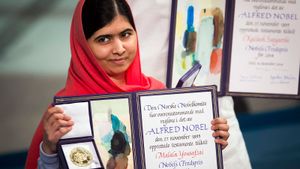Few scientists experience the unique honor of receiving an unexpected phone call with a foreign voice on the other line. At first, such an event may seem like more of an annoyance than anything else. But once the message becomes clear -- that they've won the Nobel Prize -- life won't be the same.
When 1996 Nobel laureate Peter Doherty got a phone call at 4 a.m. in his Tennessee home, his first reaction was that something had happened to his parents in Australia. Instead, he was told he had won the Nobel Prize in physiology or medicine. The committee gave him a 10-minute head start on the media. After that, the phone rang constantly -- Doherty and his family were shocked [source: Doherty].
Advertisement
The Nobel Prizes -- a set of awards honoring the best work in physics, literature, chemistry, medicine, peace and economics -- are viewed as the highest intellectual honor in the world. Alfred Nobel, peace advocate and inventor of dynamite, left the money for the first five awards in his will. In 1901, the Nobel prizes were born.
But what does it take to win a Nobel Prize?
Though there's no clear formula for success, there are certain traits common to many Nobel laureates. Above all, the prize favors people who seek to advance human knowledge or create solutions to the world's problems, with accomplishments ranging from Robert Koch's discovery of the bacterium responsible for tuberculosis to Martin Luther King Jr.'s leadership of the U.S. civil rights movement in the 1960s.
People who create paradigm shifts, or major shifts in thinking for a field, are more likely to receive a Nobel Prize for their work. For instance, it would be tough to imagine where theoretical physics would be without Albert Einstein's contributions that earned him the Nobel Prize in physics in 1921.
One way to boost your chances of scoring a Nobel is by placing yourself close to the research at hand. Ralph Steinman, a recent winner who passed away from pancreatic cancer, was so engrossed in his cancer vaccine research that he developed and tested an experimental treatment on himself in the years building up to the award [source: Altman and Wade].
In the prize's science categories, the people actually conducting the research typically win the Nobel. The Nobel Peace Prize, however, has a history of being awarded to people who are more leaderlike in their preservation of peace (think Obama in 2009) [source: NobelPrize.org].
How the person communicates with the public matters, too. Winners typically are well-versed in their field, with some even taking the extra step to explain their work to nonspecialists and general audiences. People who win the prizes don't usually strive for the honor. Instead, they're immersed in their fields and passionate about making a difference in the world.
Think you have what it takes to earn a Nobel? Find out -- next.
Advertisement












